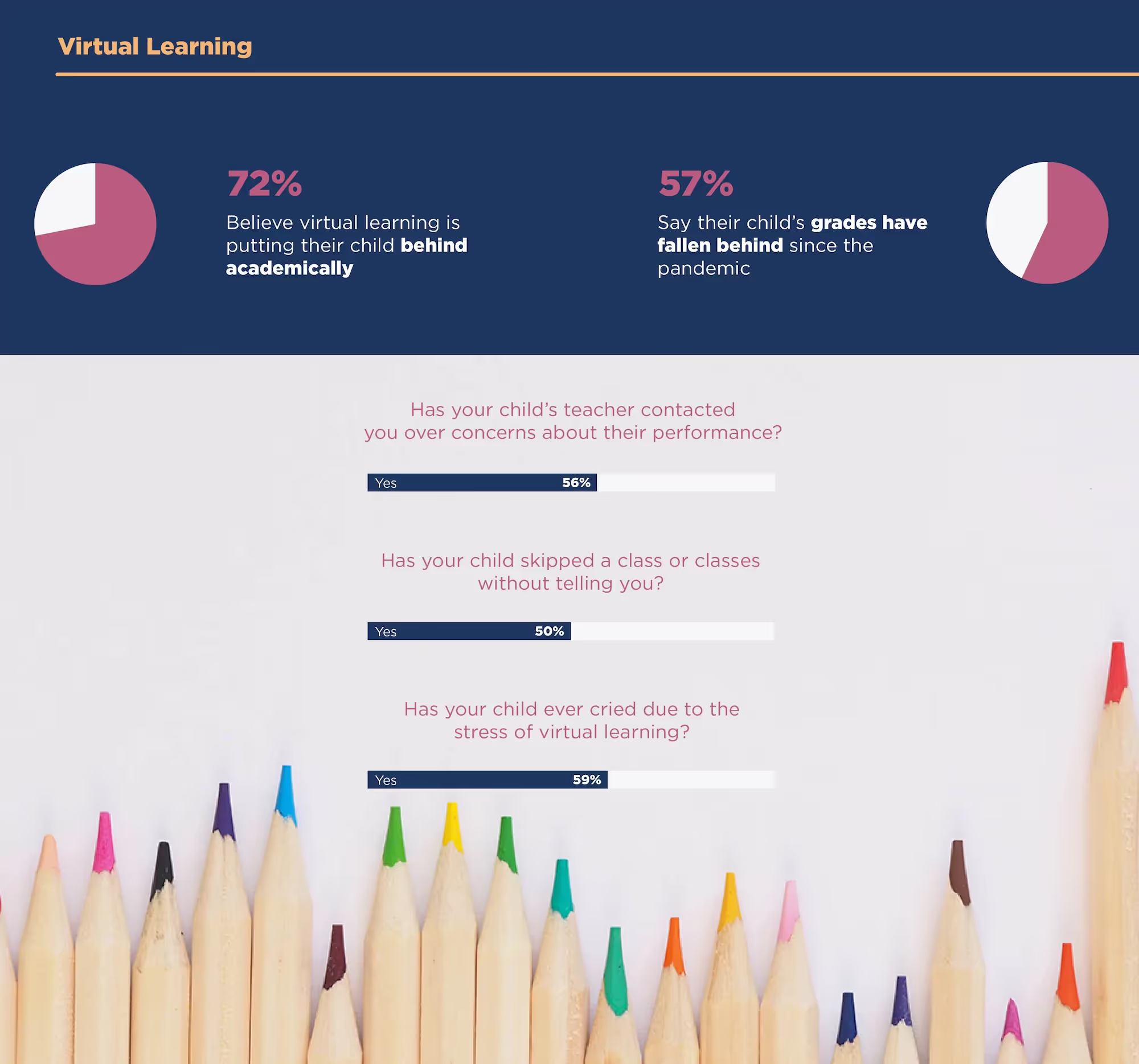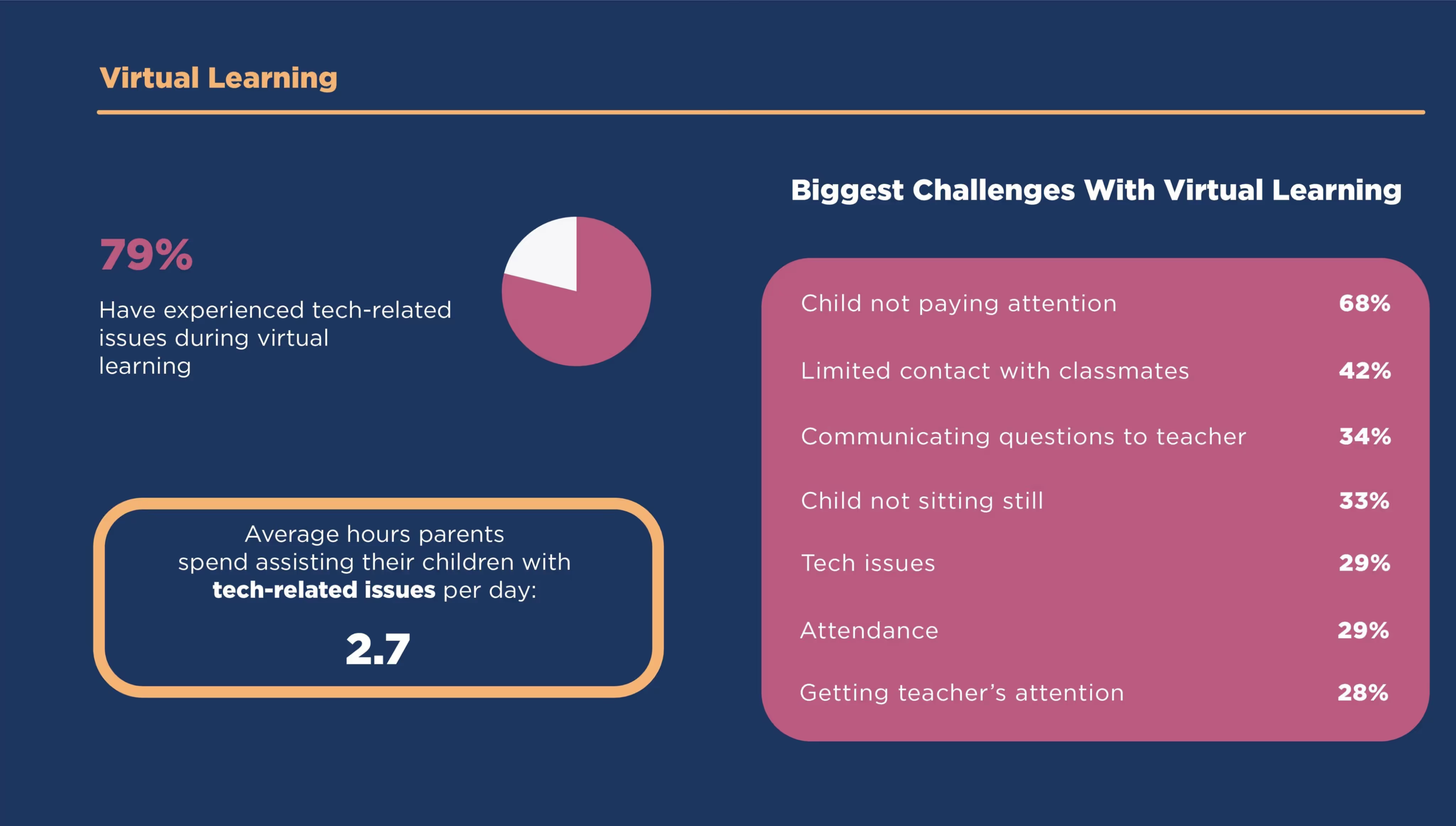There likely isn’t a segment of the US population that hasn’t been profoundly affected by the Coronavirus pandemic (COVID-19). While we don’t know the full, enduring impact, we know young children experienced multiple, potentially severe disruptions in the midst of crucial developmental stages. As classrooms became virtual and playgrounds sat empty, children faced radically new patterns of daily life, behavior, and thought.
In order to get a better understanding of how children are adapting and coping with these dramatic changes, we surveyed parents across the country about their child’s health, virtual learning, and socialization during the pandemic.
Highland partners with children’s hospitals, non-profits, and digital health innovators to find strategies that promote children’s well-being. With more than a decade of experience working with children and their families, our commitment to children’s mental health has grown. Our expertise spans across digital strategy consulting, patient experience research, experience design, and custom software development, enabling organizations to create better outcomes through the design and development of insightful, intentional physical and digital care journeys.
Now is the time to seek greater understanding about the effects of COVID-19 among children, in order to design ways to help them now and in the long-term.
Virtual Learning
As another end to the school year approaches, district policies regarding a full-time return to classrooms vary across the country. All parents, whether their child has returned to in-person learning or not, are certainly concerned about the effects of the online, interactive virtual learning environment.

According to respondents, 72% of parents believe virtual learning is putting their child behind academically, and more than half (57%) say their child’s grades have fallen behind since the pandemic. Fifty-six percent of parents surveyed also say their child’s teacher has contacted them due to concerns over their child’s performance.
Parents have also felt the impact of virtual learning. According to our survey, 79% of parents say their child has experienced tech-related issues during virtual learning. Overall, parents are spending roughly 2.7 hours per school day assisting their children with those issues. Along with technical issues, parents cited issues such as keeping their child engaged during virtual learning (68%), limited contact with other classmates (42%) and difficulties with communicating questions to their teacher (34%) as the top challenges with virtual learning.

Socializing
Along with schooling, the pandemic has changed the way children socialize. Crucial social skills have been difficult for children to develop during the pandemic due to social distancing and limited social circles.
According to respondents, 57% of parents say their child is experiencing social isolation with roughly one less hour of socializing per day than they did before the pandemic. Overall, 76% of parents say they’ve limited their child’s social circle or group in an effort to minimize contact with others.
Mental and Behavioral Health
With psychosocial changes in our environment, 46% percent of respondents say that the pandemic has had a negative effect on their child’s mental health, while 39% say they are not sure what type of effect it has had on their child. A similar percent (45%) fears these mental health and behavioral changes are irreversible.
Parents also cited noticeable changes in their child’s behavior during the spread of Covid-19. According to respondents, 67% say their child’s behavior has changed including mood swings (66%), frequent loneliness (60%), lack of motivation (56%) and depression (52%).
Coping
Considering the massive changes to children’s lives throughout the last year, it’s important to ask how both children and parents have been coping during the pandemic. Despite virtual learning, remote work, and social distancing, parents say several positives have come from pandemic life.
Overall, 85% of parents say their children have been spending more with their family and loved ones, 57% have been reading more, 66% have started a new hobby, 53% have been engaging in physical activity more, and 62% have been more creative.
With vaccinations and a better understanding of the Coronavirus disease, both parents and children are hopeful that there is a light at the end of the tunnel. While these positive coping mechanisms and behaviors are especially important to maintain, this survey shows some parents are concerned for the emotional and mental health of their children.
Supporting Children's Mental Health Needs
We’ve barely scratched the surface of the pandemics’ impact on the well-being of our children. Parents, teachers, community leaders, and health care workers will be learning together over the coming years just how significant and lasting the impact will be.
Collaboration among hospitals, families, caregivers, agencies, and other community and health leaders is critical to prioritize the effort. Let’s use the power of qualitative, exploratory, design-focused research to uncover the true needs of children and their families as they access behavioral and mental health services and resources. What we learn together will enable us to identify, design, and implement early intervention strategies across the pediatric care continuum to ensure that children and parents get the help they want, seek, and need. Instituting these positive pathways to patient-centered care will not only address today’s needs, they will also serve as a powerful means for preventing any long-term mental health conditions resulting from COVID-19.
Methodology
From March 9 to April 6, 2021, we surveyed 803 parents with younger children aged between children aged between 6 to 14 years old (K-8th grade) on the topic of virtual learning, socializing, and their child’s mental health during the pandemic. 46% were male and 54% were female with a median age of 37. Income: Under $20K: 11%; $20-40K: 23%; $40-60K: 28%; $60-80K: 17%; $80-100K: 11%; Over $100K: 10%.Employment status: Full-time: 76%; part-time: 13%; unemployed due to COVID-19: 2%; unemployed not due to COVID-19: 6%; furloughed: 1%; other: 2%.
For media inquiries, contact media@digitalthirdcoast.net.



